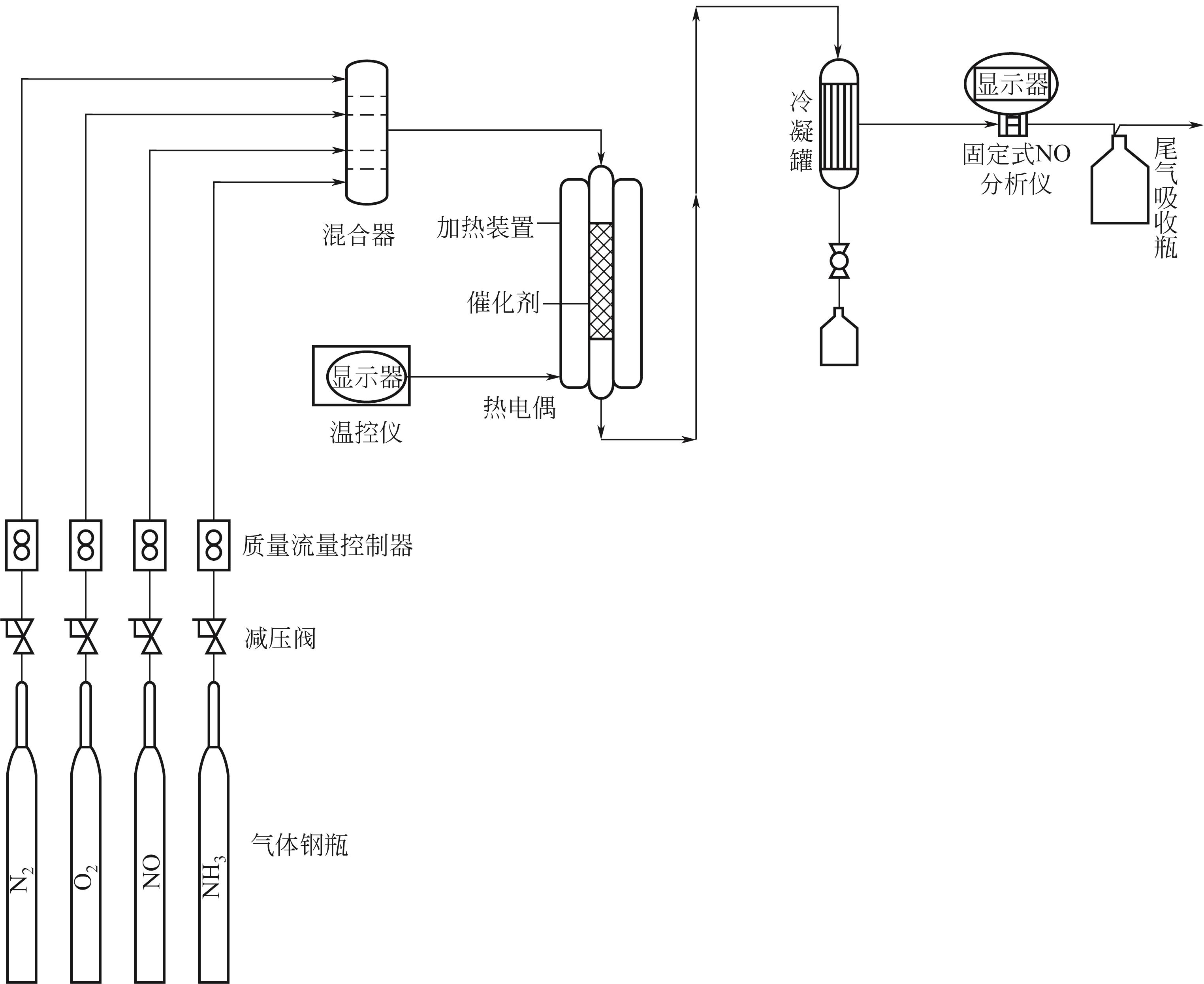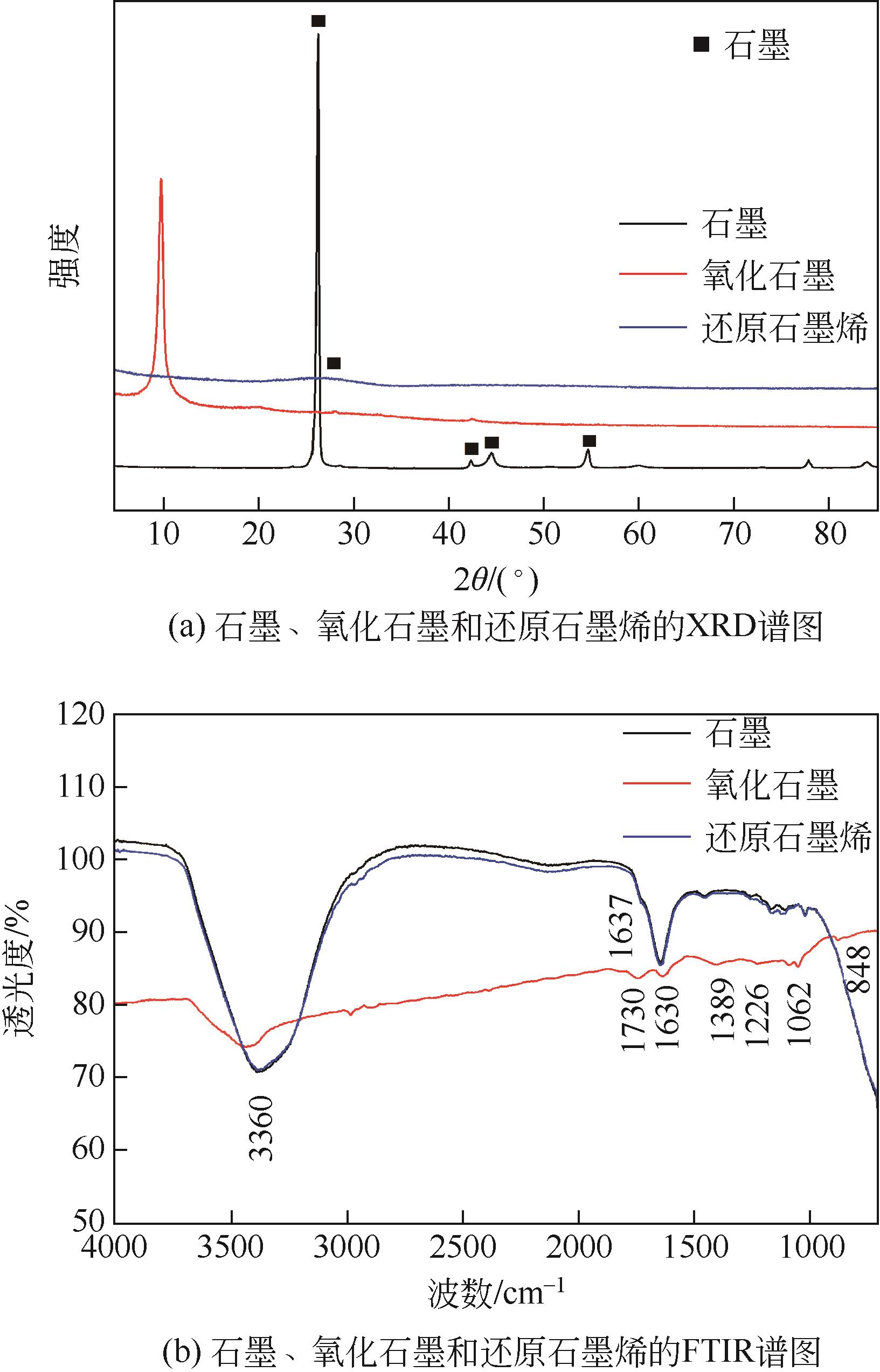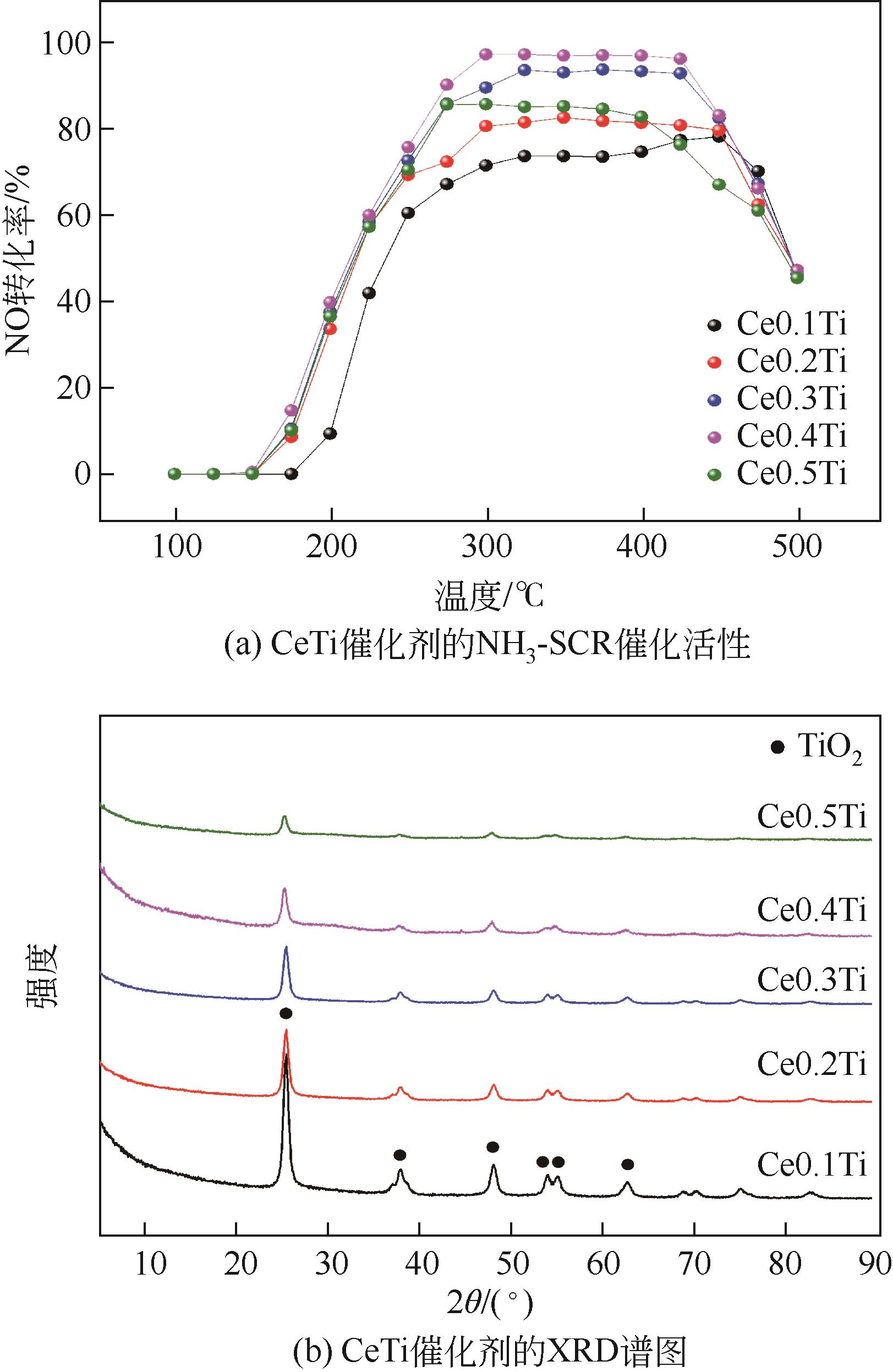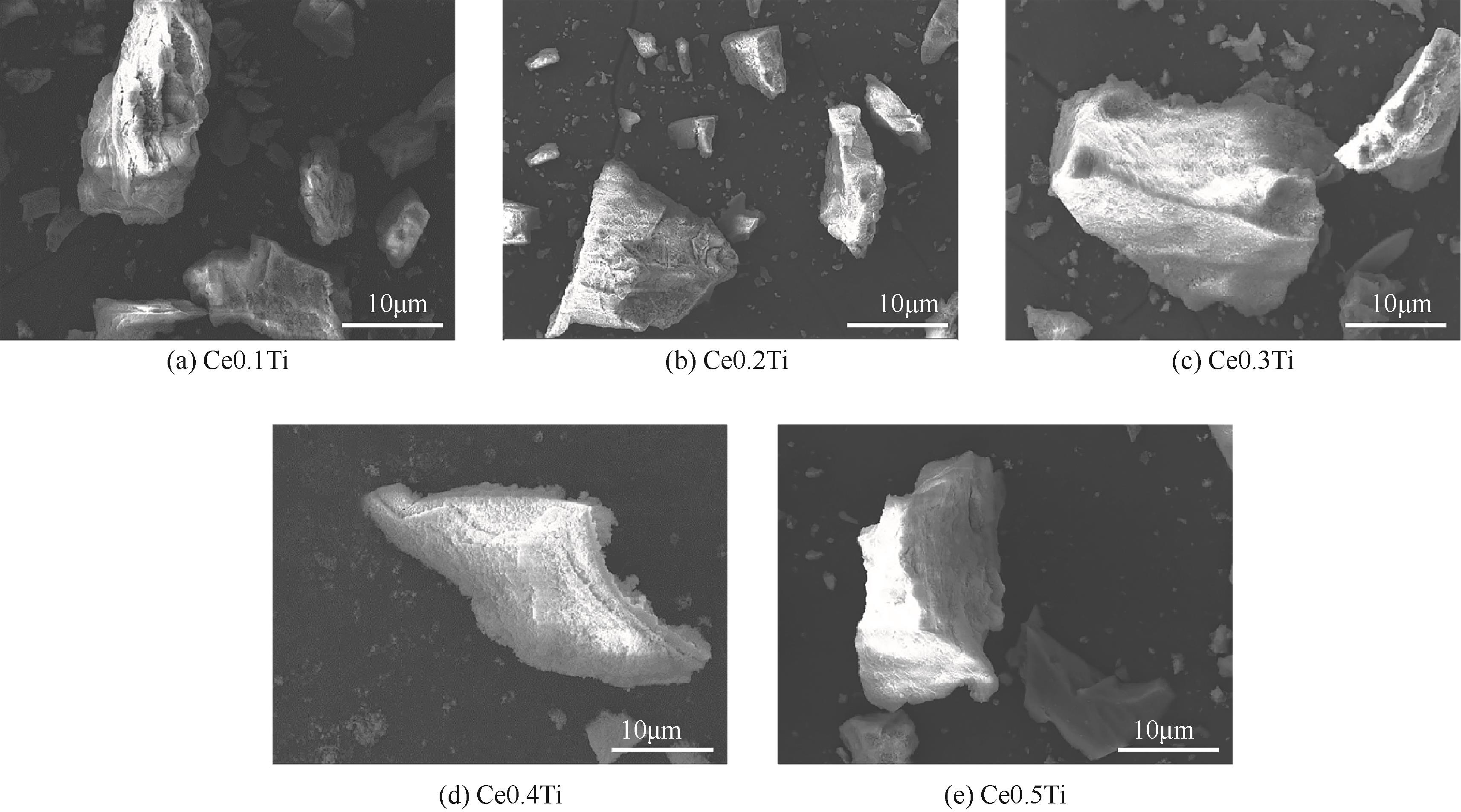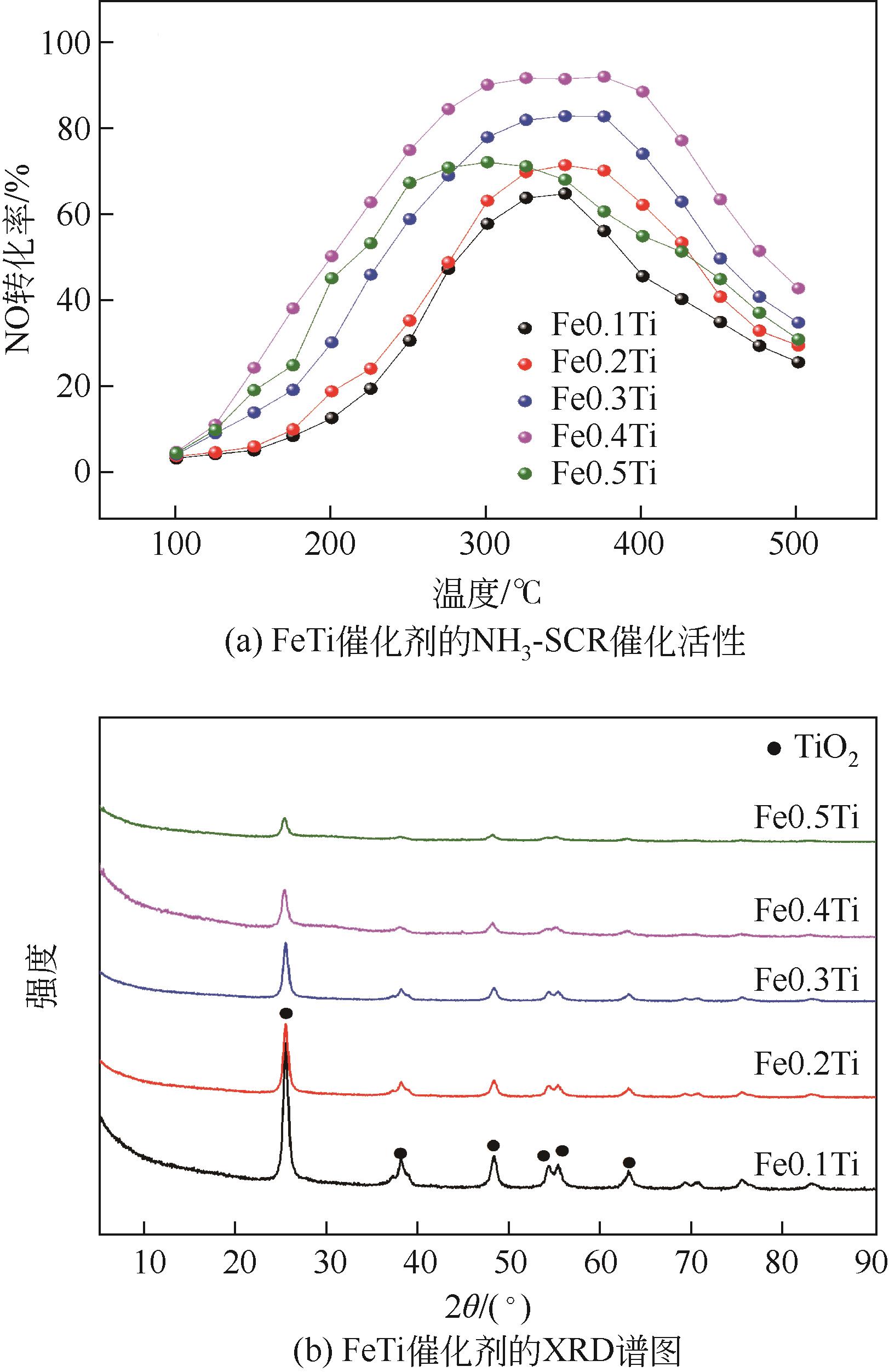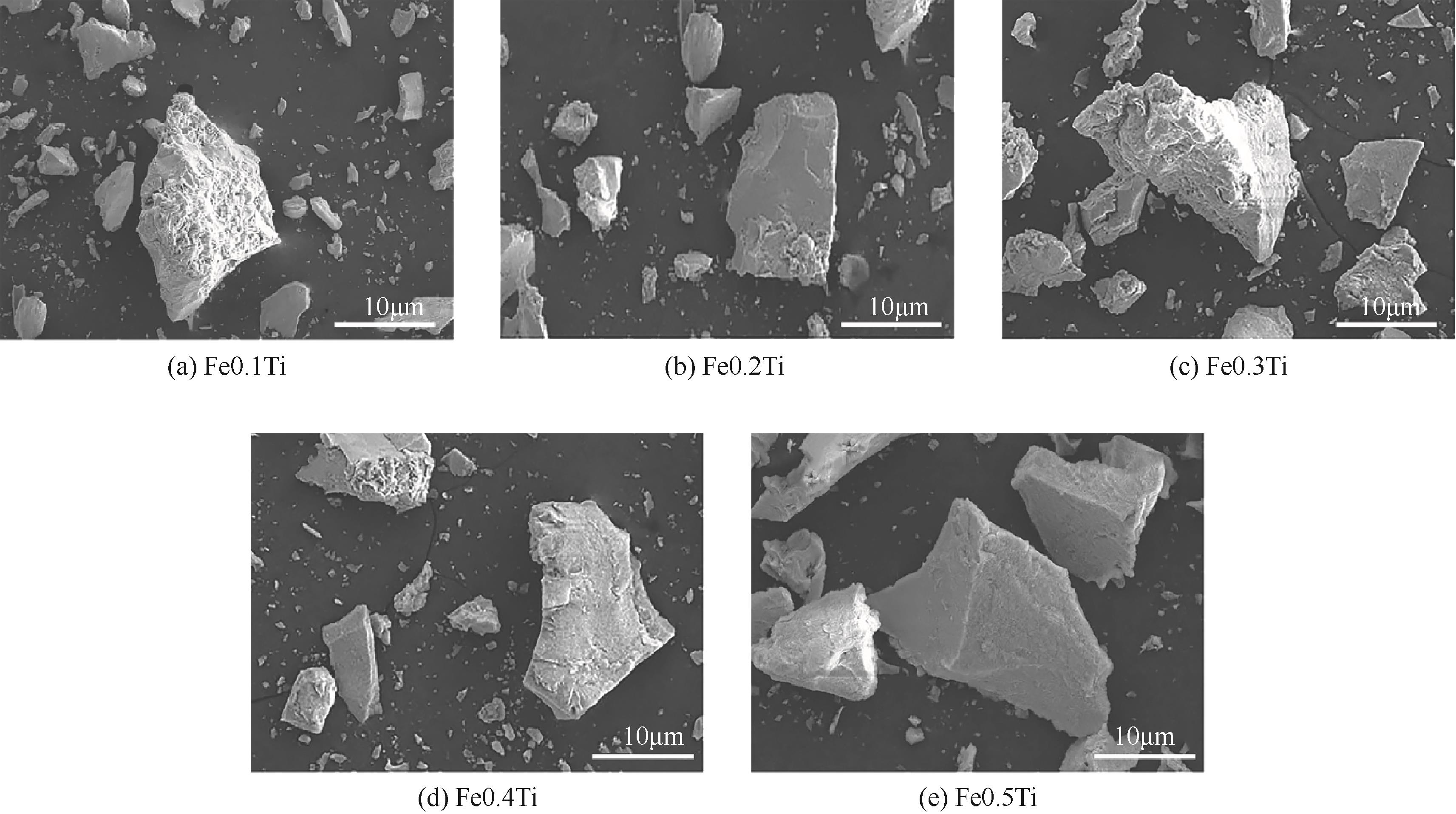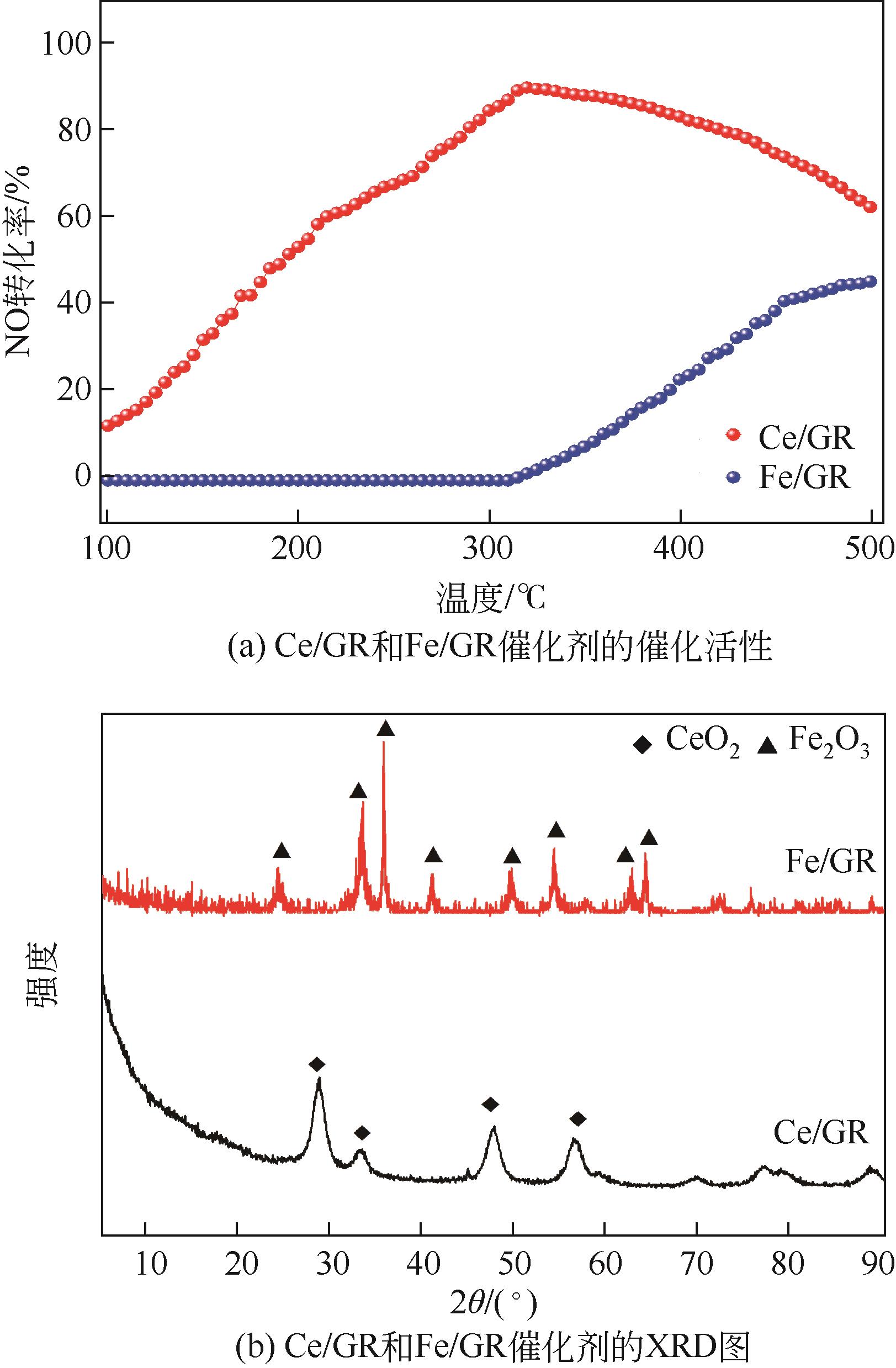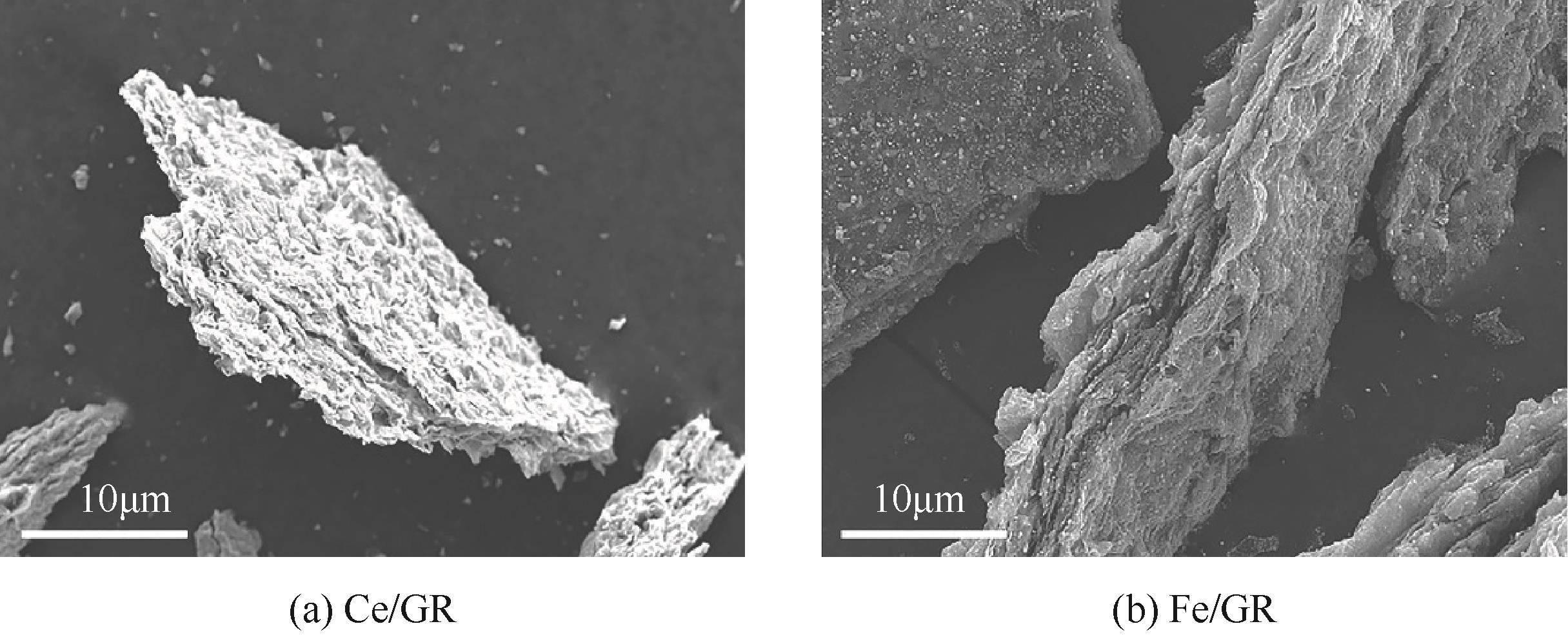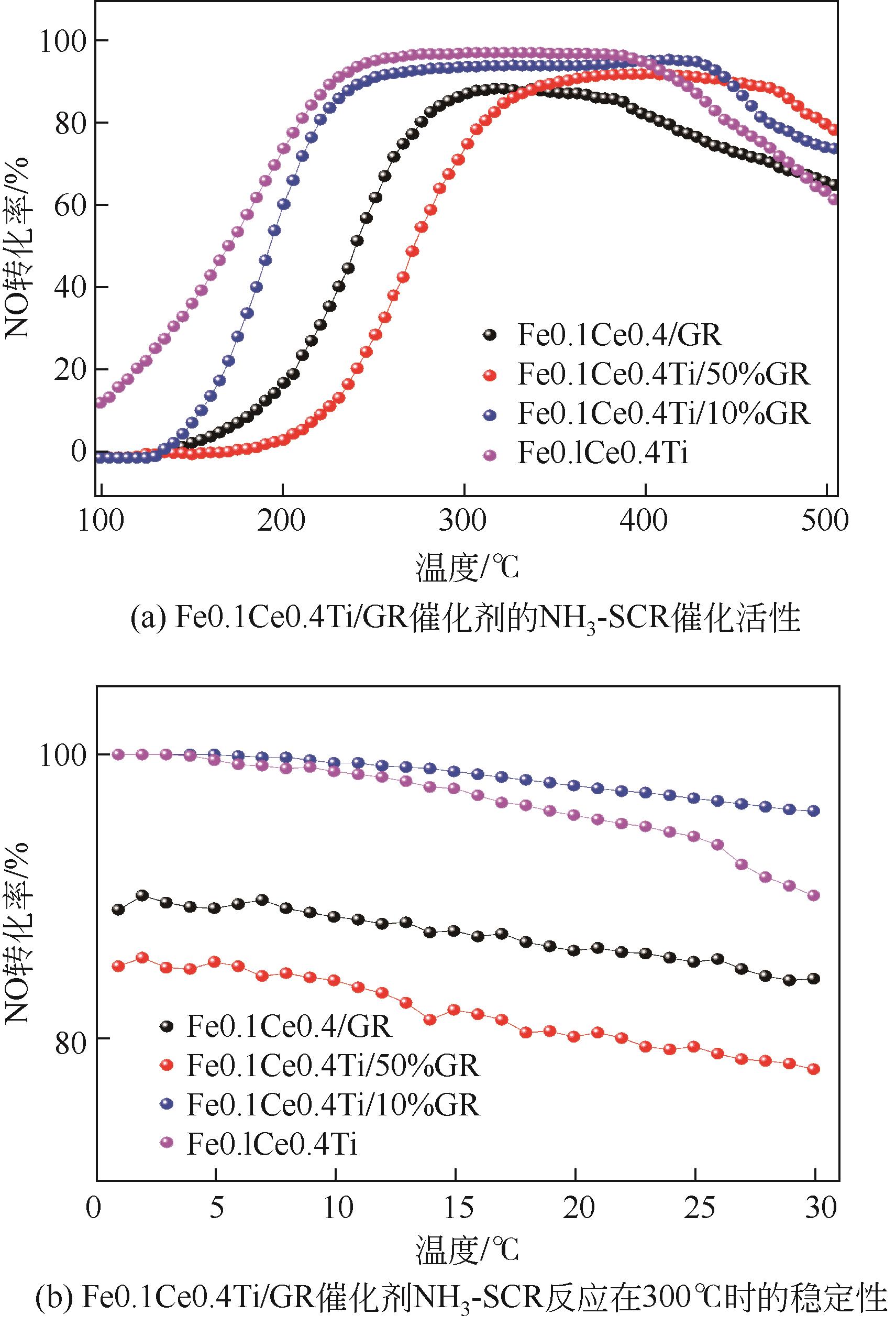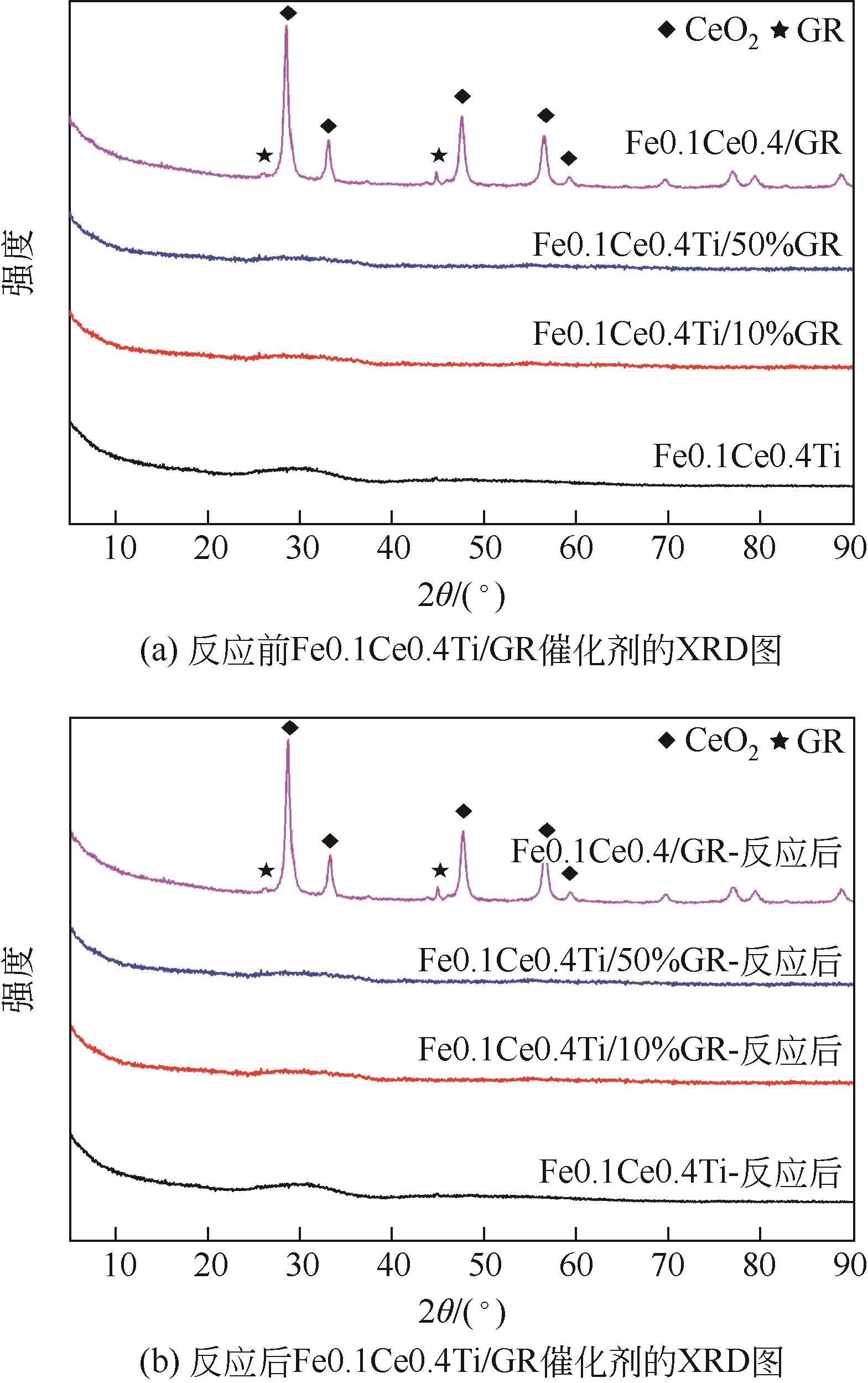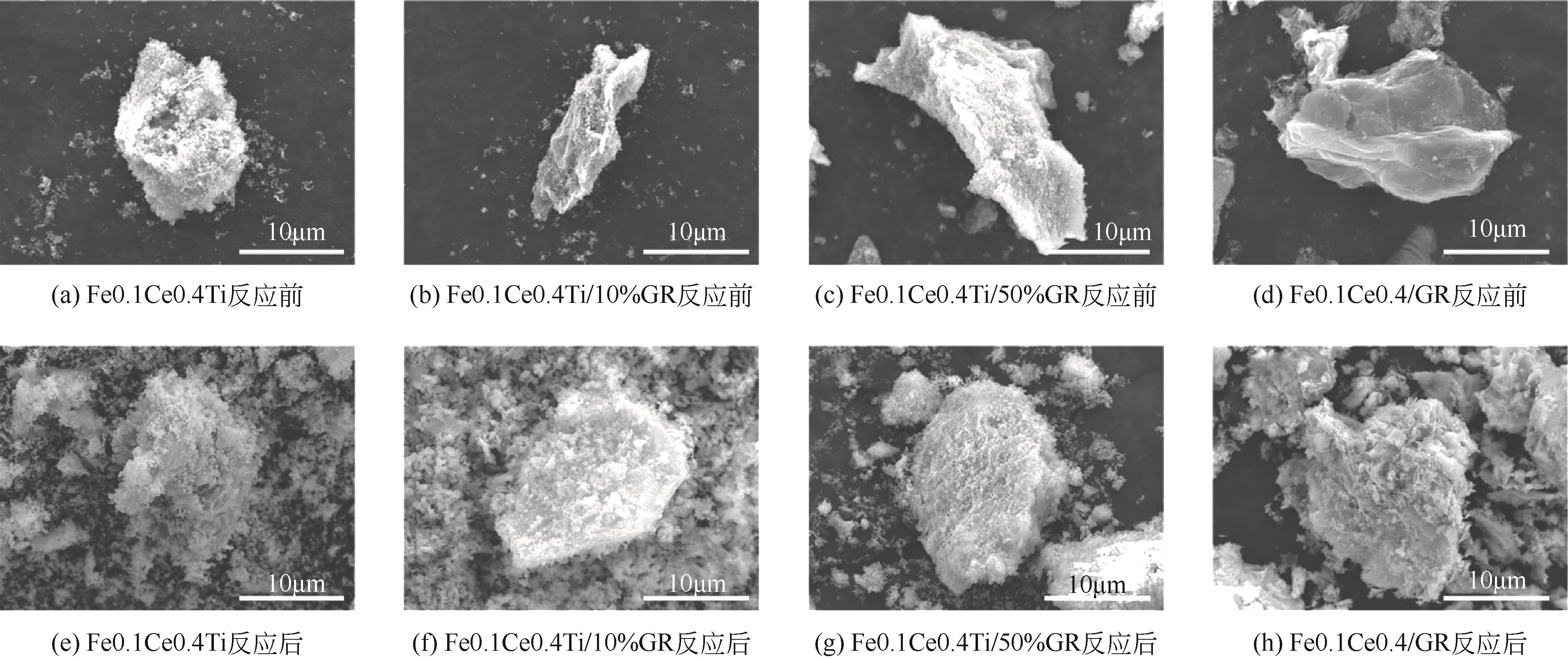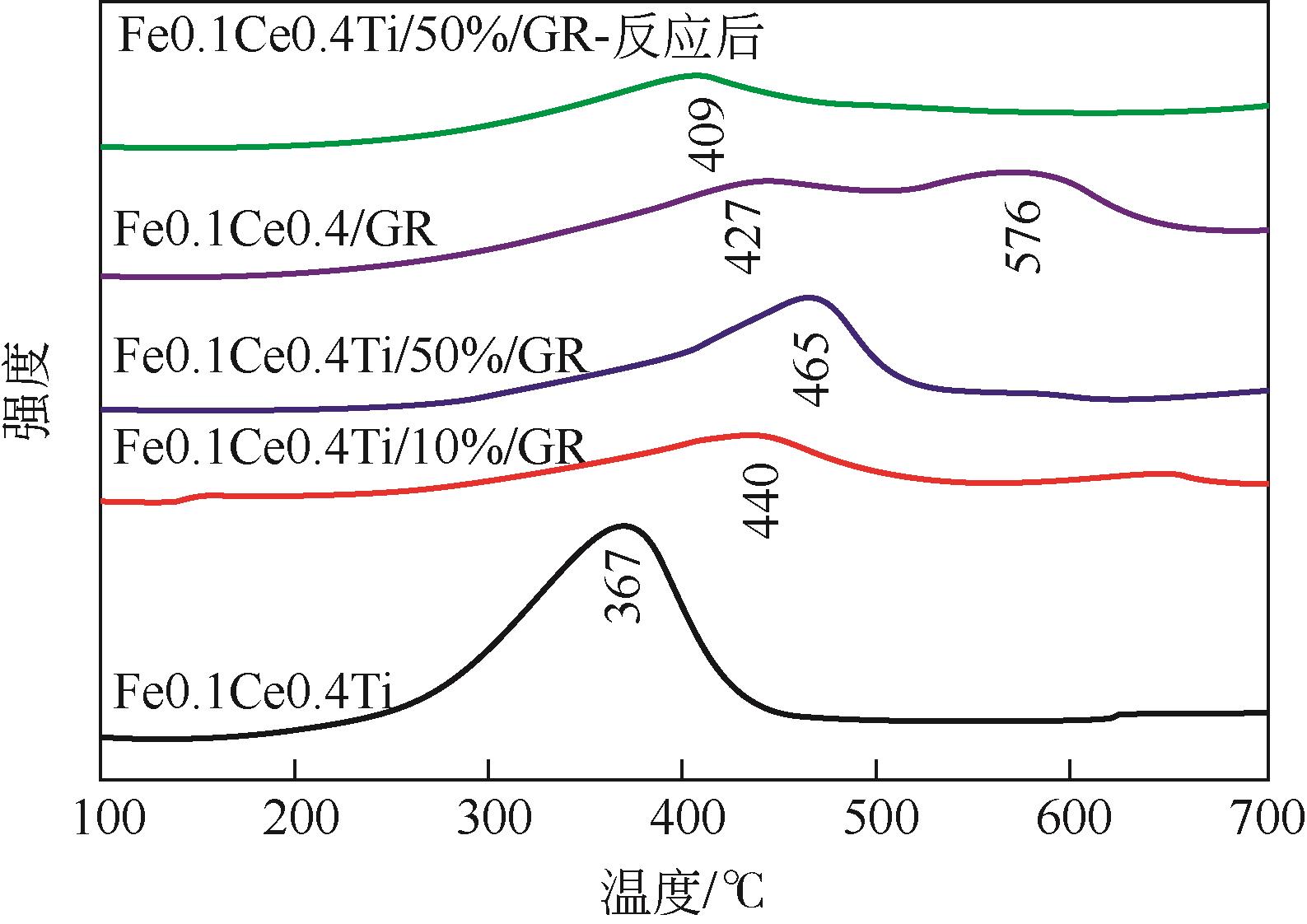Chemical Industry and Engineering Progress ›› 2024, Vol. 43 ›› Issue (3): 1456-1465.DOI: 10.16085/j.issn.1000-6613.2023-0498
• Materials science and technology • Previous Articles
Application of graphene composite supported catalyst in the removal of NO from diesel exhaust
YAN Shoucheng( ), ZHANG Huihua, XU Qianqian, WANG Yukun
), ZHANG Huihua, XU Qianqian, WANG Yukun
- School of Energy Engineering, Huanghuai University, Zhumadian 463000, Henan, China
-
Received:2023-03-31Revised:2023-07-17Online:2024-04-11Published:2024-03-10 -
Contact:YAN Shoucheng
石墨烯复合载体催化剂在柴油车尾气NO脱除中的应用
- 黄淮学院 能源工程学院,河南 驻马店 463000
-
通讯作者:闫守成 -
作者简介:闫守成(1985—),男,硕士,研究方向为车辆安全技术及轻量化。E-mail:20101174@huanghuai.edu.cn。 -
基金资助:河南省高等学校重点科研项目(23A460030);河南省科技发展计划(162102110129)
CLC Number:
Cite this article
YAN Shoucheng, ZHANG Huihua, XU Qianqian, WANG Yukun. Application of graphene composite supported catalyst in the removal of NO from diesel exhaust[J]. Chemical Industry and Engineering Progress, 2024, 43(3): 1456-1465.
闫守成, 张慧华, 徐倩倩, 王煜坤. 石墨烯复合载体催化剂在柴油车尾气NO脱除中的应用[J]. 化工进展, 2024, 43(3): 1456-1465.
share this article
Add to citation manager EndNote|Ris|BibTeX
URL: https://hgjz.cip.com.cn/EN/10.16085/j.issn.1000-6613.2023-0498
| 催化剂 | BET比表面积/m2·g-1 | 孔容/cm3·g-1 | 平均孔径/nm |
|---|---|---|---|
| Ce0.1Ti | 106.45 | 0.021 | 5.45 |
| Ce0.2Ti | 122.54 | 0.023 | 5.64 |
| Ce0.3Ti | 136.12 | 0.022 | 5.69 |
| Ce0.4Ti | 142.06 | 0.025 | 5.77 |
| Ce0.5Ti | 135.18 | 0.024 | 5.71 |
| 催化剂 | BET比表面积/m2·g-1 | 孔容/cm3·g-1 | 平均孔径/nm |
|---|---|---|---|
| Ce0.1Ti | 106.45 | 0.021 | 5.45 |
| Ce0.2Ti | 122.54 | 0.023 | 5.64 |
| Ce0.3Ti | 136.12 | 0.022 | 5.69 |
| Ce0.4Ti | 142.06 | 0.025 | 5.77 |
| Ce0.5Ti | 135.18 | 0.024 | 5.71 |
| 催化剂 | BET比表面积/m2·g-1 | 孔容/cm3·g-1 | 平均孔径/nm |
|---|---|---|---|
| Fe0.1Ti | 112.36 | 0.022 | 5.35 |
| Fe0.2Ti | 123.87 | 0.022 | 5.47 |
| Fe0.3Ti | 137.11 | 0.023 | 5.76 |
| Fe0.4Ti | 148.23 | 0.023 | 5.83 |
| Fe0.5Ti | 140.55 | 0.022 | 5.77 |
| 催化剂 | BET比表面积/m2·g-1 | 孔容/cm3·g-1 | 平均孔径/nm |
|---|---|---|---|
| Fe0.1Ti | 112.36 | 0.022 | 5.35 |
| Fe0.2Ti | 123.87 | 0.022 | 5.47 |
| Fe0.3Ti | 137.11 | 0.023 | 5.76 |
| Fe0.4Ti | 148.23 | 0.023 | 5.83 |
| Fe0.5Ti | 140.55 | 0.022 | 5.77 |
| 催化剂 | BET比表面积/m2·g-1 | 孔容/cm3·g-1 | 平均孔径/nm |
|---|---|---|---|
| Ce/GR | 279.65 | 0.025 | 3.45 |
| Fe/GR | 254.28 | 0.023 | 3.65 |
| 催化剂 | BET比表面积/m2·g-1 | 孔容/cm3·g-1 | 平均孔径/nm |
|---|---|---|---|
| Ce/GR | 279.65 | 0.025 | 3.45 |
| Fe/GR | 254.28 | 0.023 | 3.65 |
| 催化剂 | BET比表面积 /m2·g-1 | 孔容 /cm3·g-1 | 平均孔径 /nm |
|---|---|---|---|
| Fe0.1Ce0.4Ti | 178.37 | 0.026 | 3.98 |
| Fe0.1Ce0.4Ti/10%GR | 205.34 | 0.022 | 3.81 |
| Fe0.1Ce0.4Ti/50%GR | 214.35 | 0.021 | 3.77 |
| Fe0.1Ce0.4Ti/GR | 233.18 | 0.023 | 3.72 |
| 催化剂 | BET比表面积 /m2·g-1 | 孔容 /cm3·g-1 | 平均孔径 /nm |
|---|---|---|---|
| Fe0.1Ce0.4Ti | 178.37 | 0.026 | 3.98 |
| Fe0.1Ce0.4Ti/10%GR | 205.34 | 0.022 | 3.81 |
| Fe0.1Ce0.4Ti/50%GR | 214.35 | 0.021 | 3.77 |
| Fe0.1Ce0.4Ti/GR | 233.18 | 0.023 | 3.72 |
| 1 | NIU Yanqing, SHANG Tong, HUI Shien, et al. Synergistic removal of NO and N2O in low-temperature SCR process with MnO x /Ti based catalyst doped with Ce and V[J]. Fuel, 2016, 185: 316-322. |
| 2 | WANG Xie, ZHENG Yuying, LIN Jinxian. Highly dispersed Mn-Ce mixed oxides supported on carbon nanotubes for low-temperature NO reduction with NH3 [J]. Catalysis Communications, 2013, 37: 96-99. |
| 3 | KOEBEL M, ELSENER M, MADIA G. Reaction pathways in the selective catalytic reduction process with NO and NO2 at low temperatures[J]. Industrial & Engineering Chemistry Research, 2001, 40(1): 52-59. |
| 4 | 管斌, 周校平, 林赫, 等. NH3-SCR法降低柴油机NO x 排放的研究进展[J]. 车用发动机, 2007(5): 1-8. |
| GUAN Bin, ZHOU Xiaoping, LIN He, et al. Progress of research on reducing NO x emission of diesel engine with NH3-SCR technology[J]. Vehicle Engine, 2007(5): 1-8. | |
| 5 | 郑昌坤. ZSM-5负载Cu和Fe催化剂的制备及其氨选择性催化还原NO的研究[D]. 北京: 北京工业大学, 2018. |
| ZHENG Changkun. Preparation of Cu and Fe supported on ZSM-5 catalyst and study on its ammonia selective catalytic reduction of NO[D]. Beijing: Beijing University of Technology, 2018. | |
| 6 | 王雅清. 基于双重改性策略的铁铈催化剂开发及NH3-SCR催化机制研究[D]. 杭州: 浙江大学, 2022. |
| Wang Yaqing. Development of iron cerium catalyst based on dual modification strategy and Study on NH3-SCR catalytic mechanism [D]. Hangzhou: Zhejiang University, 2022. | |
| 7 | FU Mingliang, GE Yunshan, WANG Xin, et al. NO x emissions from Euro Ⅳ busses with SCR systems associated with urban, suburban and freeway driving patterns[J]. Science of the Total Environment, 2013, 452/453: 222-226. |
| 8 | 庞 磊. 柴油车尾气净化NH3-SCR催化剂[D]. 武汉:华中科技大学,2014. |
| PANG Lei. NH3-SCR catalyst for purifying diesel exhaust gas[D]. Wuhan: Huazhong University of Science and Technology, 2014. | |
| 9 | JIANG Ye, XING Zhimin, WANG Xuechong, et al. Activity and characterization of a Ce-W-Ti oxide catalyst prepared by a single step sol-gel method for selective catalytic reduction of NO with NH3 [J]. Fuel, 2015, 151: 124-129. |
| 10 | QIU Lu, PANG Dandan, ZHANG Changliang, et al. In situ IR studies of Co and Ce doped Mn/TiO2 catalyst for low-temperature selective catalytic reduction of NO with NH3 [J]. Applied Surface Science, 2015, 357: 189-196. |
| 11 | ZHU Lin, ZHONG Zhaoping, YANG Han, et al. Comparison study of Cu-Fe-Ti and Co-Fe-Ti oxide catalysts for selective catalytic reduction of NO with NH3 at low temperature[J]. Journal of Colloid and Interface Science, 2016, 478: 11-21. |
| 12 | ZHAO Kun, HAN Weiliang, LU Gongxuan, et al. Promotion of redox and stability features of doped Ce-W-Ti for NH3-SCR reaction over a wide temperature range[J]. Applied Surface Science, 2016, 379: 316-322. |
| 13 | LIU Xin, NING Ping, LI Hao, et al. Probing NH3-SCR catalytic activity and SO2 resistance over aqueous-phase synthesized Ce-W@TiO2 catalyst[J]. Journal of Fuel Chemistry and Technology, 2016, 44(2): 225-231. |
| 14 | 李美颜. V2O5/TiO2-石墨烯催化剂的制备及低温脱硝性能研究[D]. 武汉: 武汉理工大学, 2019. |
| LI Meiyan. Preparation of V2O5/TiO2-graphene catalyst and its low-temperature denitrification performance[D].Wuhan: Wuhan University of Technology, 2019. | |
| 15 | LU Xining, SONG Cunyi, JIA Shaohua, et al. Low-temperature selective catalytic reduction of NO x with NH3 over cerium and manganese oxides supported on TiO2-graphene[J]. Chemical Engineering Journal, 2015, 260: 776-784. |
| 16 | 童震松, 赵志龙, 石培良. 添加FeO x 对CeO x -MnO x -TiO2/石墨烯催化剂低温SCR脱硝性能的影响[J]. 有色金属(冶炼部分), 2022(10): 102-108. |
| TONG Zhensong, ZHAO Zhilong, SHI Peiliang. Effect of FeO x addition on low temperature SCR denitrification performance of CeO x -MnO x -TiO2/graphene catalysts[J]. Nonferrous Metals (Extractive Metallurgy), 2022(10): 102-108. | |
| 17 | LU Xining, SONG Cunyi, CHANG Chein-Chi, et al. Manganese oxides supported on TiO2-graphene nanocomposite catalysts for selective catalytic reduction of NO x with NH3 at low temperature[J]. Industrial & Engineering Chemistry Research, 2014, 53(29): 11601-11610. |
| 18 | Woojoon CHA, EHRMAN Sheryl H, JURNG Jongsoo. Surface phenomenon of CeO2-added V2O5/TiO2 catalyst based chemical vapor condensation (CVC) for enhanced selective catalytic reduction at low temperatures[J]. Chemical Engineering Journal, 2016, 304: 72-78. |
| 19 | Wen-Tse LO, NAYAK Pramoda K, LU Horng-Hwa, et al. Evolution of binary phase TiC/Ti3SiC2 composites from TiC/Ti/Si by hot-pressed reactive sintering[J]. Materials Science and Engineering: B, 2010, 172(1): 18-23. |
| 20 | 张转芳, 赵春艳, 殷广明, 等. CuO/氧化石墨烯复合材料合成、表征及光催化研究[J]. 人工晶体学报, 2016, 45(2): 398-402, 407. |
| ZHANG Zhuanfang, ZHAO Chunyan, YIN Guangming, et al. Preparation, characterization and photocatalytic property of CuO/GO nano-composite[J]. Journal of Synthetic Crystals, 2016, 45(2): 398-402, 407. | |
| 21 | LIU Fudong, HE Hong, ZHANG Changbin. Novel iron titanate catalyst for the selective catalytic reduction of NO with NH3 in the medium temperature range[J]. Chemical Communications, 2008(17): 2043-2045. |
| 22 | LIU Fudong, HE Hong, ZHANG Changbin, et al. Selective catalytic reduction of NO with NH3 over iron titanate catalyst: Catalytic performance and characterization[J]. Applied Catalysis B: Environmental, 2010, 96(3/4): 408-420. |
| [1] | LIU Fangwang, HAN Yi, ZHANG Jiajia, BU Honghong, WANG Xingpeng, YU Chuanfeng, LIU Mengshuai. Research advance of heterogeneous catalytic system for the coupling between CO2 and epoxide into propylene carbonate [J]. Chemical Industry and Engineering Progress, 2024, 43(3): 1252-1265. |
| [2] |
ZHANG Pengfei, YAN Zhangyan, REN Liang, ZHAGN Kui, LIANG Jialin, ZHAO Guangle, ZHANG Fanbin, HU Zhihai.
Research progress in the catalytic hydrodealkylation of C |
| [3] | GU Xingpeng, MA Hongqin, LIU Jiahao. Modification of Rainey nickel with phosphorus quantum dots and its catalytic hydrodesulfurization performances [J]. Chemical Industry and Engineering Progress, 2024, 43(3): 1293-1301. |
| [4] | ZHANG Shuming, LIU Huazhang. Optimization of Fe1-x O ammonia synthesis catalyst by BP neural network model [J]. Chemical Industry and Engineering Progress, 2024, 43(3): 1302-1308. |
| [5] | LI Kairui, GAO Zhaohua, LIU Tiantian, LI Jing, WEI Haisheng. Tuning the catalytic performance of Rh/FePO4 catalyst by reduction temperature for quinoline selective hydrogenation [J]. Chemical Industry and Engineering Progress, 2024, 43(3): 1342-1349. |
| [6] | LIU Bin, WANG Yongjun, LYU Wangyang, CHEN Wenxing. Preparation and application of high stability titanium polyester catalyst TiOC@SiO2 [J]. Chemical Industry and Engineering Progress, 2024, 43(3): 1395-1402. |
| [7] | WANG Xiong, KANG Wenqian, REN Yue, QIAO Tongsen, ZHANG Peng, HUANG Anping, LI Guangquan. Pilot scale production of porous organic polymers and their application in polyolefin catalysts [J]. Chemical Industry and Engineering Progress, 2024, 43(3): 1412-1417. |
| [8] | YAN Yu, XIA Xin, LUO Junpeng, LIU Dapeng, QIAN Feiyue. Effects of peroxide types on the removal of anti-inflammatory medicines in water with rGO/CNTs catalytic membranes [J]. Chemical Industry and Engineering Progress, 2024, 43(3): 1436-1445. |
| [9] | WANG Yansen, HOU Dandan, LI Changjin, QI Liya, WANG Chunyao, GUO Min, WANG Ying. Preparation and properties of graphene oxide/polyacrylic acid conductive and adhesive hydrogels [J]. Chemical Industry and Engineering Progress, 2024, 43(2): 1022-1032. |
| [10] | CHEN Xiaozhen, LIU Li, YANG Chengmin, ZHENG Bumei, YIN Xiaoying, SUN Jin, YAO Yunhai, DUAN Weiyu. Research progress of alumina-supported hydrodesulfurization catalyst [J]. Chemical Industry and Engineering Progress, 2024, 43(2): 948-961. |
| [11] | DING Kang, HE Junqiao, CHEN Yuanjie, YANG Xiazhen, LIU Huazhang, HUO Chao. Effect of hydrochloric acid treatment on catalytic performance of Ru/Ba-MgO catalyst template cotton fiber [J]. Chemical Industry and Engineering Progress, 2024, 43(2): 962-970. |
| [12] | WANG Darui, SUN Hongmin, WANG Yiyan, TANG Zhimou, LI Rui, FAN Xueyan, YANG Weimin. Recent progress in zeolite for efficient catalytic reaction process [J]. Chemical Industry and Engineering Progress, 2024, 43(1): 1-18. |
| [13] | LUO Fen, YANG Xiaoqi, DUAN Fanglin, LI Xiaojiang, WU Liang, XU Tongwen. Recent advances in the bipolar membrane and its applications [J]. Chemical Industry and Engineering Progress, 2024, 43(1): 145-163. |
| [14] | GAI Hongwei, ZHANG Chenjun, QU Jingying, SUN Huailu, TUO Yongxiao, WANG Bin, JIN Xu, ZHANG Xi, FENG Xiang, CHEN De. Research progress on catalytic dehydrogenation process intensification for liquid organic hydride carrier hydrogen storage [J]. Chemical Industry and Engineering Progress, 2024, 43(1): 164-185. |
| [15] | ZHANG Jiahao, LI Yingying, XU Yanlin, YIN Jiabin, ZHANG Jisong. Research advancement of continuous reductive amination in microreactors [J]. Chemical Industry and Engineering Progress, 2024, 43(1): 186-197. |
| Viewed | ||||||
|
Full text |
|
|||||
|
Abstract |
|
|||||
